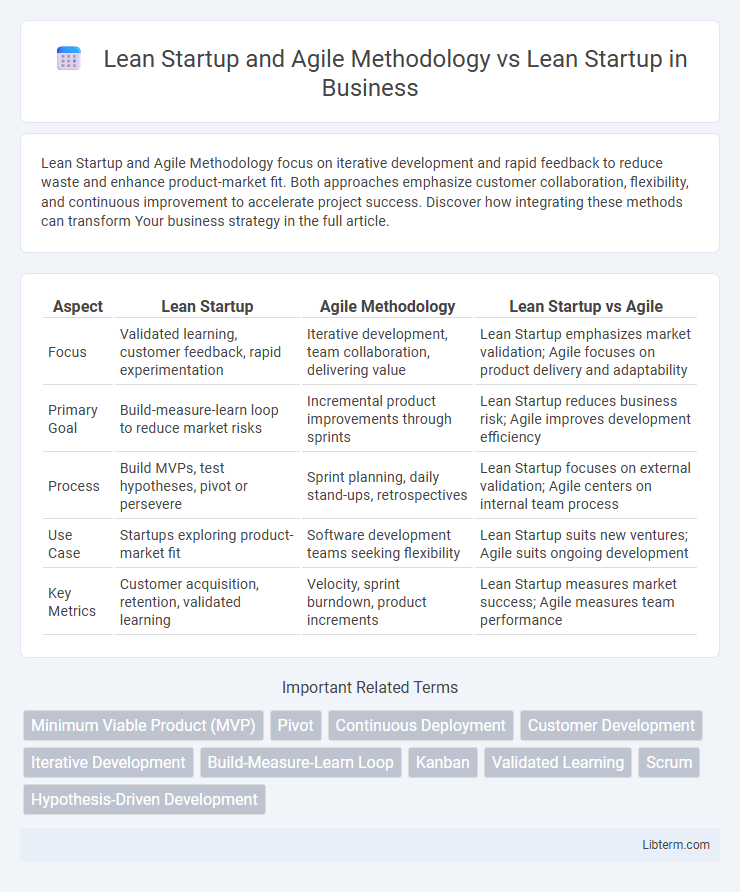Lean Startup and Agile Methodology focus on iterative development and rapid feedback to reduce waste and enhance product-market fit. Both approaches emphasize customer collaboration, flexibility, and continuous improvement to accelerate project success. Discover how integrating these methods can transform Your business strategy in the full article.
Table of Comparison
| Aspect | Lean Startup | Agile Methodology | Lean Startup vs Agile |
|---|---|---|---|
| Focus | Validated learning, customer feedback, rapid experimentation | Iterative development, team collaboration, delivering value | Lean Startup emphasizes market validation; Agile focuses on product delivery and adaptability |
| Primary Goal | Build-measure-learn loop to reduce market risks | Incremental product improvements through sprints | Lean Startup reduces business risk; Agile improves development efficiency |
| Process | Build MVPs, test hypotheses, pivot or persevere | Sprint planning, daily stand-ups, retrospectives | Lean Startup focuses on external validation; Agile centers on internal team process |
| Use Case | Startups exploring product-market fit | Software development teams seeking flexibility | Lean Startup suits new ventures; Agile suits ongoing development |
| Key Metrics | Customer acquisition, retention, validated learning | Velocity, sprint burndown, product increments | Lean Startup measures market success; Agile measures team performance |
Introduction to Lean Startup and Agile Methodology
Lean Startup emphasizes rapid experimentation, validated learning, and iterative product releases to minimize waste and accelerate market fit, leveraging customer feedback to refine business models. Agile Methodology focuses on incremental development, collaboration, and flexibility within software development through frameworks like Scrum and Kanban to respond quickly to change. Comparing Lean Startup and Agile reveals that while both prioritize adaptability and continuous improvement, Lean Startup centers on business model validation, whereas Agile targets efficient project execution and delivery.
Core Principles of Lean Startup
Lean Startup centers on continuous innovation through build-measure-learn feedback loops, emphasizing validated learning to reduce waste and align products with customer needs. Agile Methodology prioritizes iterative development and flexibility but lacks explicit focus on validated learning and hypothesis-driven experimentation present in Lean Startup. Core principles of Lean Startup include rapid prototyping, customer development, and pivoting based on data-driven insights to optimize startup success.
Key Concepts of Agile Methodology
Agile methodology emphasizes iterative development, continuous feedback, and adaptive planning to enhance flexibility and customer collaboration throughout the project lifecycle. Key concepts include cross-functional teams, sprints, and user stories, enabling rapid delivery of functional software and constant improvement. These principles contrast with Lean Startup's focus on hypothesis-driven experimentation and validated learning for product-market fit.
Similarities Between Lean Startup and Agile
Lean Startup and Agile methodologies share a focus on iterative development and rapid feedback loops to enhance product-market fit and customer satisfaction. Both emphasize adaptive planning, continuous improvement, and early risk mitigation through frequent testing and validation of assumptions. The integration of cross-functional teams and incremental delivery further aligns their approaches to fostering innovation and efficient project management.
Differences: Lean Startup vs Agile Methodology
Lean Startup emphasizes rapid experimentation, validated learning, and customer feedback to develop a minimal viable product (MVP) that meets market needs. Agile Methodology concentrates on iterative development, collaboration, and flexibility within software teams to deliver functional software increments frequently. The primary difference lies in Lean Startup's focus on business model validation and market fit, while Agile centers on optimizing the product development process and team efficiency.
When to Use Lean Startup Approach
The Lean Startup approach is ideal for early-stage ventures and innovative projects focused on developing new products or markets with high uncertainty, enabling fast validation of hypotheses through minimum viable products (MVPs). Agile Methodology suits iterative development and continuous improvement in established projects or teams with clearer requirements and ongoing customer feedback. Using Lean Startup is crucial when the goal is to test assumptions rapidly, pivot when necessary, and minimize wasted resources in uncertain market conditions.
Optimal Scenarios for Agile Methodology
Agile methodology excels in dynamic environments where customer feedback and iterative development drive project success, making it optimal for software development and rapidly evolving markets. Lean Startup emphasizes validated learning through build-measure-learn cycles, ideal for early-stage ventures seeking product-market fit with minimal waste. Agile is best suited when frequent releases and adaptability to changing requirements are critical, whereas Lean Startup thrives in uncertainty by minimizing risk and accelerating innovation.
Lean Startup and Agile: Integration Possibilities
Lean Startup and Agile methodology share core principles like iterative development, customer feedback, and flexibility, making their integration highly effective for product innovation. Agile's sprint cycles complement Lean Startup's Build-Measure-Learn loop by enabling rapid prototyping and continuous validation, accelerating time-to-market while reducing waste. Integrating Lean Startup with Agile practices fosters adaptive project management, enhances product-market fit, and drives sustainable business growth through data-driven decision-making.
Challenges in Combining Lean Startup and Agile
Combining Lean Startup and Agile methodologies often encounters challenges such as aligning iterative product development cycles with rapid experimentation and validated learning principles, which can lead to conflicts in prioritization and resource allocation. Teams may struggle to balance Agile's emphasis on incremental delivery with Lean Startup's focus on hypothesis-driven pivots, resulting in potential delays in decision-making and product-market fit validation. Effective integration requires clear communication, flexible workflows, and a shared understanding of metrics to manage the tension between speed, adaptability, and customer-centric innovation.
Conclusion: Choosing the Right Approach for Your Project
Selecting the right approach depends on your project's goals and development environment. Lean Startup emphasizes rapid experimentation and validated learning to minimize market risks, ideal for early-stage ventures seeking product-market fit. Agile methodology prioritizes iterative development and customer collaboration, making it suitable for projects requiring flexibility and continuous improvement throughout the development lifecycle.
Lean Startup and Agile Methodology Infographic

 libterm.com
libterm.com